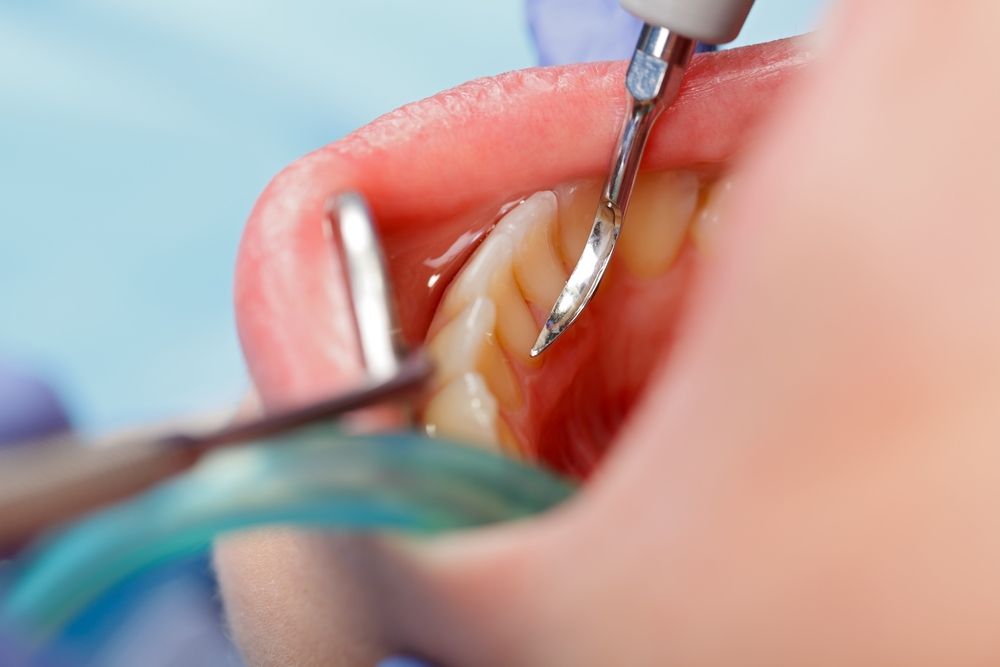Maintain Healthy Teeth and Gums with Periodontal Care
Healthy teeth and gums are essential for optimal oral and overall well-being. Periodontal care is important for managing and preventing gum disease, which can cause pain, bleeding, and even tooth loss if untreated. At our Sterling, VA, practice, Dr. E. Richard Hughes can perform a gentle deep cleaning to alleviate your discomfort and remove harmful bacteria from your gums. No matter what your periodontal needs may be, we can help you maintain healthy gums for a lifetime of benefits.
Why Periodontal Care is Important
In recent years, research has confirmed there is a direct link between periodontal health and whole-body health. When bacteria is present in the oral cavity, it is also present in the bloodstream. Therefore, infection can be carried to major organs and tissues throughout the body. If left untreated, periodontal disease can lead to a myriad of serious health-related issues, including stroke, heart disease, dementia, and more.
When diagnosed early, periodontal disease can be addressed with minimally invasive, conservative treatments.
About Periodontal Disease
Periodontal disease begins as gingivitis. This condition is characterized by inflamed and tender gums that often bleed when brushing or flossing. This irritation is caused by a build-up of bacteria-laden plaque around the teeth. Gingivitis is typically reversible with improved oral hygiene. By removing the plaque, the irritants are removed, making the gums healthy.
If gingivitis is left untreated, the condition worsens. The bacteria seeps into the gum line and begins to compromise the jawbone. This can create periodontal pockets around the teeth, which harbor more debris and bacteria. At this stage, the condition is referred to as periodontitis. It is impossible to reach these areas with brushing and flossing alone. Therefore, periodontal treatments are necessary to eradicate the bacteria. If periodontitis is allowed to continue untreated, there will be further damage to the bone and periodontal ligaments. This can result in a number of serious dental concerns, including mobility and even tooth loss.
Oftentimes, periodontal disease is not painful until it has progressed to unmanageable levels. Therefore, it is important to see your dentist at the first sign of problems. You may have periodontal disease if you notice:
- Swollen, red, tender, or bleeding gums
- Gum recession
- Bad breath or taste
- Loose teeth
- Shifting teeth

Periodontal Treatment Options
When diagnosed early, periodontal disease can be addressed with minimally invasive, conservative treatments. At our practice, Dr. Hughes can perform:
- Scaling and root planing: Similar to a routine dental cleaning, scaling and root planing removes the plaque and bacteria from the teeth for a healthier smile. However, in this case, the gums will be numbed with local anesthesia so the hygienist can clean deeper into the gum line, sweeping out debris and buildup that has become impacted. In addition to cleaning the teeth, the root surfaces will also be smoothed to discourage further irritants from reattaching. Depending on the severity of your periodontal disease, this treatment may be completed in a single visit, or it may require multiple appointments.
- Pocket irrigation and reduction: During pocket reduction surgery, plaque is removed and the periodontal pockets are reduced. Typically, pocket irrigation is performed at the same time as this procedure, which will help to flush out any irritants.
- Gingivectomy: Due to ensuing bone loss, periodontal disease increases the gaps between the teeth over time. A gingivectomy can excise diseased tissue and reshape the gum line to reduce the risk of infection in these areas.
- TwinLight
Schedule a Consultation with Us Today
If you are experiencing symptoms of periodontal disease, such as bleeding, swollen, or tender gums, schedule a consultation with Dr. Hughes. He can help you determine the most conservative, effective treatment to address your needs. Contact us online anytime, or call our office at (703) 444-1152 to schedule your appointment.

